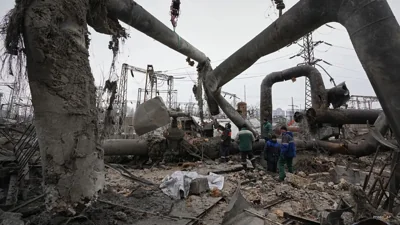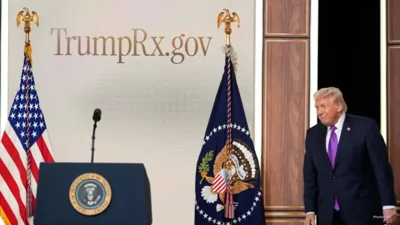
Post by : Priya
Photo:Reuters
In an increasingly fast-changing world, technology is shaping how we live, work, learn, and connect. The tools and machines that seemed futuristic only a decade ago—voice-controlled assistants, intelligent traffic systems, and computer programs that make decisions—are now part of our everyday lives. However, behind these technologies lies something even more powerful: the systems and networks that make them work.
Recognizing the need for these systems to be built stronger, safer, and closer to home, the White House has launched an ambitious national effort to boost the country’s smart technology infrastructure. This move is not only about keeping pace with global developments, but also about securing the country's future, strengthening the economy, and giving American workers a bigger role in the world’s digital growth.
Understanding the Shift: Why Now?
The decision to push forward this infrastructure plan comes at a crucial time.
Over the past few years, there has been a surge in the use of intelligent machines and tools—used in everything from farming and medicine to transportation and national defense. These tools rely on powerful chips, fast data centers, and strong internet networks to function. But many of these parts are currently built outside the U.S., making the country dependent on international suppliers.
This has raised serious concerns. What if a political dispute, a war, or a natural disaster stops the supply of these essential parts? How will that affect the healthcare system, the economy, or even national security?
With these questions in mind, the U.S. government is acting quickly to reduce reliance on other nations and ensure that the tools of tomorrow are built at home, by American workers, using American technology.
The Heart of the Plan: Building the Backbone of Smart Tools
The new push is focused on one key goal: strengthening the country’s base for smart tools and systems. Here’s what that means:
1. Powerful Chips Built in the U.S.
At the center of smart machines are microchips—tiny electronic parts that do the thinking. Currently, most of these chips are made in countries like Taiwan and South Korea. While these countries are trusted allies, the U.S. wants to reduce its risks by producing more chips at home.
Under the new plan, billions of dollars will be spent to build chip-making factories in states like Arizona, Ohio, and Texas. These factories will not only produce chips for local needs but also create thousands of jobs.
2. More Data Centers
Smart tools use large amounts of data. That data needs to be stored, processed, and shared safely. To do this, the country needs more data centers—large buildings filled with powerful computers.
These new centers will be built with better energy standards and high-level protection against cyberattacks, making them both green and secure.
3. Stronger Internet Networks
A smart system can’t work without fast and stable internet. Whether it's self-driving cars or digital hospitals, strong connections are essential.
The government is putting funds into expanding high-speed internet to all areas, including rural towns and poor neighborhoods that have long been left behind. This step will help ensure that everyone—no matter where they live—can take part in the new digital world.
4. Energy for the Future
Running smart systems takes a lot of power. To meet this need, the government is working to link the tech infrastructure plan with clean energy goals. Solar, wind, and hydroelectric projects will supply the needed electricity for new factories and data centers, helping the U.S. meet its climate goals.
Safety, Ethics, and Fair Use
Technology can do amazing things—but it can also be misused. With this in mind, the White House has stressed the need for ethical standards and laws to guide how smart tools are used.
The new plan includes steps to:
Economic Growth and Job Creation
This infrastructure plan isn’t just about machines—it’s about people. A big part of the plan is focused on creating jobs and training programs for workers.
Over the next five years, the White House expects:
Thousands of new jobs in chip-making, network building, and data center management.
Training programs in schools, colleges, and community centers to teach people the skills needed in this new field.
Support for small businesses, especially those owned by women and minorities, to join the smart tech supply chain.
This will help build a stronger, fairer economy where more people can take part in the digital future.
Staying Ahead in a Global Race
While the U.S. is investing billions, other countries are not standing still. China is rapidly growing its tech systems. The European Union is building its own chip industry. India is training millions of young workers in smart technologies.
To stay ahead, the U.S. must not only spend money but also act quickly and wisely. The White House’s plan focuses on speed, local partnerships, and long-term thinking.
It also calls for deeper ties between the government, private companies, and universities—so that innovation happens faster, smarter, and more safely.
Voices from Across the Nation










Mattel Revives Masters of the Universe Action Figures Ahead of Film Launch
Mattel is reintroducing Masters of the Universe figures in line with its upcoming film, tapping into

China Executes 11 Members of Criminal Clan Linked to Myanmar Scam
China has executed 11 criminals associated with the Ming family, known for major scams and human tra

US Issues Alarm to Iran as Military Forces Deploy in Gulf Region
With a significant military presence in the Gulf, Trump urges Iran to negotiate a nuclear deal or fa

Copper Prices Reach Unprecedented Highs Amid Geopolitical Turmoil
Copper prices soar to all-time highs as geopolitical tensions and a weakening dollar boost investor

New Zealand Secures First Win Against India, Triumph by 50 Runs
New Zealand won the 4th T20I against India by 50 runs in Vizag. Despite Dube's impressive 65, India

BTS Tour Sparks Global Demand: Mexico Appeals for Additional Shows
BTS' comeback tour creates immense demand in Mexico, prompting President Sheinbaum to urge more conc